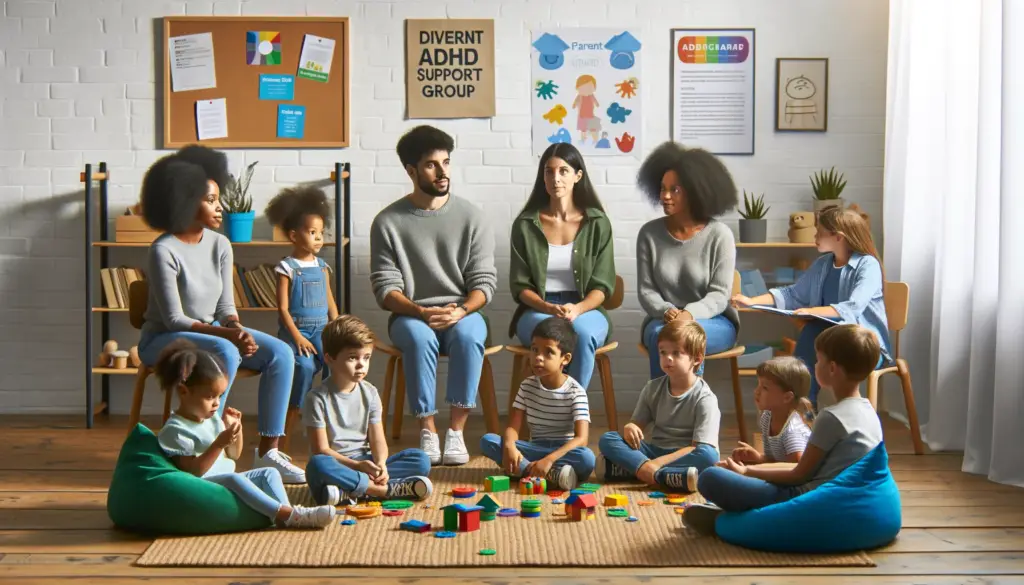If you or a loved one has ADHD, you may feel like you’re facing the challenges of this condition alone. It can be difficult for those with ADHD to find support, but you don’t have to navigate this journey alone. ADHD support groups can provide the community, resources, and connections you need to manage ADHD effectively.
In this section, we will explore the benefits of ADHD support groups and how they can help you cope with the challenges of this condition. We’ll discuss different types of support groups available, how to find the right one for you, and what to expect when you participate in these groups. Whether you’re new to ADHD or have been living with it for years, there’s a support group out there for you.
Key Takeaways:
- ADHD Peer Network offer valuable resources and connections for individuals with ADHD and their loved ones.
- There are different types of ADHD support groups available to cater to specific needs.
- Finding the right ADHD Peer Network group is important in receiving the right kind of support.
- Participating in ADHD support group activities and resources can enhance coping with the condition.
- ADHD Peer Network can also provide specific resources and support for parents and caregivers of children with ADHD.
Understanding ADHD: Symptoms, Challenges, and Treatment Options
ADHD, or Attention Deficit Hyperactivity Disorder, is a neurodevelopmental disorder that affects approximately 8-10% of children and 4% of adults worldwide.
Some common symptoms of ADHD include inattention, hyperactivity, distractibility, impulsivity, and forgetfulness. These symptoms can lead to emotional, social, and academic challenges for individuals with ADHD, as they may struggle with organization, time-management, and completing tasks.
The challenges posed by ADHD can be mitigated through a variety of treatment options. Common treatments include medication, therapy, and lifestyle changes. Treatment plans are highly individualized and may require a holistic approach incorporating various therapies and resources to improve quality of life for those with ADHD.
Resources are available to help individuals and families coping with ADHD. These resources may include educational materials, support groups, counseling, and coaching services. Access to supportive services is crucial for effectively managing ADHD and improving overall well-being.
“The strongest predictor of success in ADHD management is access to supportive resources and regular monitoring by a mental health professional.”
ADHD Treatment Options:
| Treatment Type | Description |
|---|---|
| Medication | ADHD medicines are designed to improve concentration and reduce impulsivity. Commonly prescribed medications include stimulants and non-stimulants. |
| Behavioral Therapy | Behavioral therapy is a recommended treatment for children with ADHD as it can help establish routines and learning strategies to cope with the symptoms. |
| Cognitive Behavioral Therapy (CBT) | CBT can help individuals with ADHD identify thought patterns and behaviors that impede progress. Through CBT, individuals can learn coping mechanisms to manage symptoms effectively. |
| Lifestyle Changes | Nutrition and exercise play a crucial role in ADHD management. Supplements, dietary changes, and physical activity can all contribute to symptom reduction. |
Understanding the symptoms and available treatment options can improve your experience with ADHD. Next, in the article, we will explore the benefits of joining ADHD peer support, which can provide valuable resources, encouragement, and support for individuals with ADHD.
Benefits of Joining an ADHD Support Group
Joining an ADHD support group offers numerous benefits that can improve your quality of life and ability to manage your symptoms. Here are some strategies, tips, and coping mechanisms that you can gain from participating in an ADHD support group:
Peer Support
Connecting with other individuals who are also coping with ADHD can provide a sense of belonging and validation. Peer support can help not only to reduce feelings of isolation, but also to inspire new ideas and strategies for managing ADHD symptoms.
ADHD Strategies
An ADHD Peer Network can provide you with practical strategies and tips to help manage your symptoms. Through discussions and shared experiences, you can learn specific tactics for coping with procrastination, time management, organization, and other challenges commonly associated with ADHD.
ADHD Tips
In an ADHD support group, you can learn tips and tricks for managing your emotional state, maintaining focus, and increasing productivity. Members can share their personal strategies and techniques for handling ADHD-related stress, anxiety, and impulsivity.

“Being a part of an ADHD community has helped me realize I am not alone in my struggles and has given me access to a wealth of knowledge and tips to improve my daily life.”
No one understands the challenges of ADHD better than people who have experienced them firsthand. Joining an ADHD Peer Network can provide you with valuable insights, strategies, and support to help you thrive.
Finding the Right ADHD Support Group for You
There are numerous ADHD support groups available, each with its unique range of benefits and drawbacks. When selecting an appropriate support group, research is key. Start by identifying your specific needs and preferences, such as whether you’d prefer an in-person or virtual group. Once you have a clear idea of what you’re looking for, begin your search by utilizing resources like ADHD Peer Network. These directories can help you discover local or online support groups that meet your requirements.
Another way to find appropriate support groups is by consulting with mental health professionals. Ask your therapist, psychiatrist, or healthcare provider for recommendations. Additionally, consider reaching out to advocacy organizations such as CHADD and ADDA for potential group options.
Before joining a group, take the time to attend a session or two to ensure that the group aligns with your personal goals and needs. Lastly, remember that no group will be perfect for everyone, so try out different options until you find a community that resonates with you.
Types of ADHD Support Groups

ADHD Peer Network come in various forms, from general peer support to more focused groups targeting specific subgroups such as parents, adults, or women with ADHD. Consider your personal needs and interests when selecting a group, and don’t be afraid to try out different options until you find the right fit.
| Type of ADHD Peer Network | Description |
|---|---|
| Peer Support Groups | These groups often consist of individuals with ADHD sharing their experiences, strategies, and advice in a welcoming environment. |
| Therapeutic Groups | Therapeutic groups are led by a mental health professional and focus on building coping skills, managing symptoms, and addressing underlying emotional and psychological issues. |
| Educational Groups | These groups are led by experts in the field and provide education and resources on various aspects of ADHD, such as treatment options or strategies for managing symptoms. |
Remember that there is no one-size-fits-all approach when it comes to finding the right ADHD support group. Take the time to research and explore different options until you find a supportive and empowering community that resonates with you.
Participating in ADHD Peer Network Activities and Resources
Joining an ADHD peer network can provide valuable resources and support to individuals and their loved ones. To make the most of your experience, consider participating in various group activities and utilizing available resources.
Group Activities
Many ADHD peer support network offer group activities to facilitate open discussion and provide valuable coping strategies. Examples of group activities include:
- Group therapy sessions
- Exercise groups
- Workshops on organization and time management
- Support group meetings
Participating in group activities can be a great way to connect with like-minded individuals and gain valuable insights into coping with ADHD.
Utilizing Available Resources
ADHD peer network also offer a wealth of resources to help individuals manage their symptoms and challenges. Some available resources may include:
- Online forums and discussion boards
- Library of ADHD-related books and materials
- Access to expert speakers and ADHD specialists
- Community events and social gatherings
Make sure to take advantage of available resources to enhance your support group experience and gain valuable knowledge and insights.

Participating in support group activities and utilizing available resources can greatly benefit individuals and their families coping with ADHD. Take advantage of these opportunities to connect with others, gain valuable insights, and enhance your ADHD journey.
Parenting a Child with ADHD: Support for Parents and Caregivers
Parenting a child with Attention Deficit Hyperactivity Disorder (ADHD) can be a challenging experience. As a parent or caregiver, it can be overwhelming to navigate the many symptoms and behaviors associated with ADHD, including hyperactivity, impulsivity, and difficulty focusing.
It’s important for parents and caregivers to understand that they are not alone in this journey. There are many resources available to support families of children with ADHD, including support groups, therapists, and educational materials.
The Importance of Support Groups
Support groups for parents and caregivers of children with ADHD can provide a safe and supportive environment to connect with others who are going through similar experiences. These groups often offer valuable resources and information on coping strategies, ADHD tips, and parenting techniques.
“Joining an ADHD peer network has made a world of difference for me as a parent. I’ve learned so much about how to manage my child’s ADHD, and I’ve met other parents who truly understand what I’m going through.” – Sarah, parent of a child with ADHD
Strategies for Parenting a Child with ADHD
There are many strategies parents and caregivers can use to support their child with ADHD. These strategies may include developing a structured routine, setting clear expectations and consequences, and implementing positive reinforcement techniques.
| Strategy | Description |
|---|---|
| Develop a structured routine | Children with ADHD often thrive on structure and predictability. Establishing a regular routine can help them feel more organized and in control. |
| Set clear expectations and consequences | Children with ADHD may have difficulty understanding the consequences of their actions. Setting clear expectations and consequences can help them learn appropriate behavior. |
| Implement positive reinforcement | Positive reinforcement techniques, such as rewards for good behavior, can be highly effective in encouraging children with ADHD to exhibit positive behaviors. |
Resources for Parents and Caregivers
In addition to support groups, there are many other resources available to parents and caregivers of children with ADHD. These may include educational materials, therapy, and specialized programs.
It’s important to work closely with your child’s healthcare provider to determine the best course of treatment and to access the most appropriate resources for your family’s needs.
Key takeaway:
Parenting a child with ADHD can be challenging, but there are many resources available to support families. Support groups, coping strategies, and educational resources can help parents and caregivers navigate the journey alongside their child with ADHD.
Conclusion
Joining an ADHD peer network can be a life-changing decision for individuals with ADHD and their loved ones. By finding a supportive community, understanding ADHD, and participating in group activities and resources, individuals with ADHD can learn valuable coping strategies, connect with like-minded individuals, and gain a sense of belonging that can make all the difference.
Remember that there are various ADHD support groups out there, so take the time to find the right fit for your specific needs. Whether you’re a parent, caregiver, or individual with ADHD, there is a community out there for you. Utilize available resources, connect with others, and take advantage of the benefits of ADHD peer support network to effectively manage life with ADHD.
FAQ
Are ADHD support groups only for individuals with ADHD?
No, ADHD peer support are not limited to individuals with ADHD. They also welcome family members, friends, and caregivers who want to learn more about ADHD and support their loved ones.
How can I find ADHD support groups in my area?
To find ADHD support groups, you can start by contacting local mental health clinics, community centers, and ADHD organizations. Online directories and forums can also provide valuable information and connections to local ADHD support groups.
What can I expect from an ADHD support group meeting?
ADHD support group meetings typically involve discussions, sharing experiences, and learning strategies for coping with ADHD. Some groups may also bring in guest speakers, provide educational resources, or organize social activities.
Can I attend multiple ADHD support groups?
Yes, you can attend multiple ADHD peer support groups if you find that each one offers unique perspectives or serves different needs. It’s important to find the right balance and ensure that attending multiple groups does not become overwhelming.
Is it necessary to share personal information during ADHD support group meetings?
Sharing personal information in ADHD support group meetings is optional and up to your comfort level. Some individuals find solace in opening up, while others prefer to listen and learn from others without sharing their own experiences.
Are virtual ADHD support groups just as effective as in-person ones?
Virtual ADHD support groups have become increasingly popular and can be just as effective as in-person ones. Online platforms provide opportunities for connection, education, and resource sharing, allowing individuals to partake in support groups from the comfort of their own homes.
Can ADHD support groups replace professional treatment?
ADHD support groups are not a substitute for professional treatment. However, they complement treatment by providing additional emotional support, coping strategies, and a sense of community. It’s important to work with healthcare professionals to develop a comprehensive treatment plan for ADHD.
How can ADHD support groups benefit parents of children with ADHD?
ADHD peer support offer parents of children with ADHD valuable insights, strategies, and resources. These groups provide a space to share experiences, learn from other parents, and receive support in navigating the unique challenges of parenting a child with ADHD.
Are there any self-help resources available through ADHD support groups?
Many ADHD support groups provide self-help resources such as books, articles, online courses, and workshops. These resources aim to empower individuals with ADHD and their families by offering additional knowledge and tools for managing symptoms and improving overall well-being.
Support Groups for Adults – ADDA – Attention Deficit Disorder Association https://add.org/virtual-peer-support/- CHADD Affiliate Locator – Find a Local ADHD Support Group in Your Area https://chadd.org/find-a-chadd-affiliate/
- Virtual Support Groups for Adults with ADHD – CHADD https://chadd.org/virtual-support-groups-for-adults-with-adhd/
- ADDA Virtual Peer Support Groups for Adults with ADHD https://add.org/virtual-peer-support-groups/
- Adult ADHD Peer Support Community – ADHD Online https://adhdonline.com/adult-adhd-peer-support/
- ADHD Adults UK – Peer Support Groups https://adhduk.co.uk/peer-support-groups/



